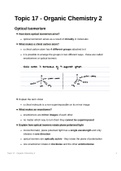Lecture notes
A Level Edexcel Chemistry - Topic 17 - Organic Chemistry 2/II
- Institution
- PEARSON (PEARSON)
A Level Edexcel Chemistry - Topic 17 - Organic Chemistry 2/II Fully updated notes providing drop down answers to self made questions designed from numerous textbooks and exam mark schemes
[Show more]



